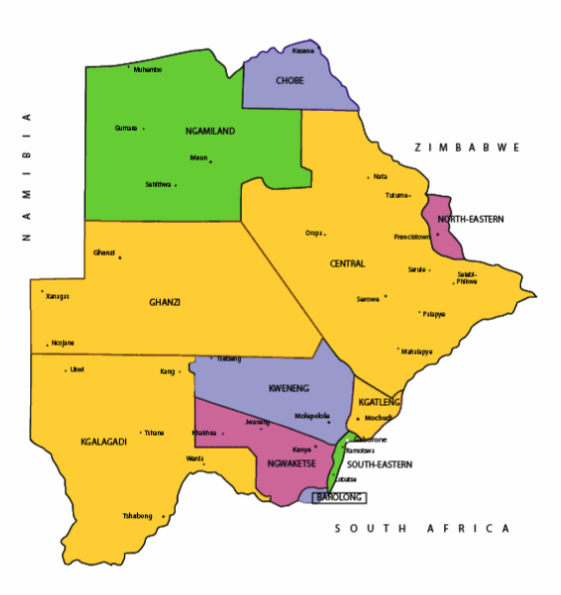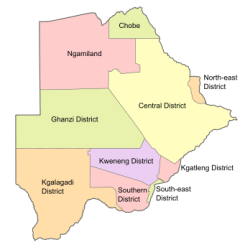Places and their polling stations in Selibe Phikwe East, Botswana
139 Botshabelo North
0683 Boitshoko Primary School
0684 Motopi-Tshwaragano Road
0685 Sptc Tower Light No. 2
140 Botshabelo West
0686 Community Hall
0687 Open Space Next To Rammai
0688 Open Space Next To Kgomo Le Namane
141 Botshabelo Central
0689 Botshabelo Kgotla
0690 Bobirwa Street Cul-De-Sec
0691 Mmakaseterata-Scotch Open Space
142 Botshabelo East
0692 Dikeleko Medupe Vending Area
0693 Pidimpete Way Cul-De-Sec
0694 Sptc Tower Light No. 3
143 Botshabelo South
0695 Shha Ward Office
0696 Nutrition Centre
0697 Kukama Road-Lesole Clinic
0698 Botshabelo Primary School
0699 Phase 3 Shha Office
0700 Mekorong (Tent)
144 Ikageleng Phase 1
0701 Ikageleng Community Centre
0702 Ikageleng Kgotla
0703 Thabologo Primary School
145 Ikageleng Phase 2
0704 St. John Church
0705 Phatsimo JSS
0706 Open Space Next To Lot 11748
Reference: iec.gov.bw/index.php/electoral-districts/polling-stations.html
Botswana
Botswana is a country in Africa. It is topographically flat, with approximately 70 percent of its territory being the Kalahari Desert.
It is bordered by South Africa to the south and southeast, Namibia to the west and north, and Zimbabwe to the northeast.
Capital: Gaborone
Currency: Botswanan Pula
Official language: English
Population: 2.588 million (2021) World Bank
Dialing code: +267
Gross Domestic Product: 17.61 billion USD (2021) World Bank
Botswana’s ten districts are:
- Southern District
- South-East District
- Kweneng District
- Kgatleng District
- Central District
- North-East District
- Ngamiland District
- Kgalagadi District
- Chobe District
- Ghanzi District
Botswana’s councils created from urban or town councils are: Gaborone City, Francistown, Lobatse Town, Selebi-Phikwe Town, Jwaneng Town, Orapa Town and Sowa Township.






The name Botswana refers to ‘Land of the Tswana’. The landlocked, Southern Africa country is officially known as the Republic of Botswana.














Botswana is connected to Zambia through the Kazungula Bridge making it the world’s shortest border between two countries.
A country of slightly over 2 million people (2021), Botswana is one of the most sparsely populated countries in the world. It is essentially the nation state of the Tswana ethnic group, who make up 79% of the population.

About 11.6 per cent of the population lives in the capital and largest city, Gaborone.
Formerly one of the world’s poorest countries—with a GDP per capita of about US$70 per year in the late 1960s—it has since transformed itself into an upper-middle-income country, with one of the world’s fastest-growing economies.


The Tswana ethnic group were descended mainly from Bantu-speaking tribes who migrated southward of Africa to modern Botswana, living in tribal enclaves as farmers and herders.




In 1885, the British colonised the area and declared a protectorate under the name of Bechuanaland.
As colonisation stopped, Bechuanaland became an independent republic under its current name on 30 September 1966.


Since then, it has been a representative republic, with a consistent record of uninterrupted democratic elections and the lowest perceived corruption ranking in Africa since at least 1998.

The economy is dominated by mining and tourism. Botswana has a GDP (purchasing power parity) per capita of about $18,113 as of 2021, one of the highest in subsaharan Africa.


Botswana is the world’s biggest diamond producing country.
Its relatively high gross national income per capita gives the country a high standard of living and the third-highest Human Development Index of continental Sub-Saharan Africa (after Gabon and South Africa).
The country has been adversely affected by the HIV/AIDS epidemic. In 2002, Botswana began offering anti-retroviral drugs (ARVs) to help combat the epidemic.
Botswana is a member of the Southern African Customs Union, the Southern African Development Community, the Commonwealth of Nations, and the United Nations.

